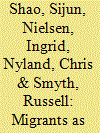| Srl | Item |
| 1 |
ID:
055215


|
|
|
| 2 |
ID:
076888


|
|
|
|
|
| Publication |
2007.
|
| Summary/Abstract |
Since China enacted the Wildlife Protection Law in 1988, its wildlife has been threatened with the most serious survival crisis. In the prereform era, wildlife was a neglected policy area. Serving the objective of reform, the Wildlife Protection Law upholds the "protection, domestication, and utilization" norm inherited from past policies. It establishes rules for wildlife management and protection. This law provides for penalties against violations. Yet, its ambiguous objectives, limited protection scope, and decentralized responsibilities have made its enforcement difficult. Political factors such as institutional constraints, national obsession with economic growth, shortage of funding, and local protectionism have made the Wildlife Protection Law enforcement an uphill struggle. This study calls for a revision in the Wildlife Protection Law to drop the "protection for human use" objective, expand protection scope, introduce anticruelty provisions, and nationalize protection responsibilities. Understanding that the current one-party state will continue in the foreseeable future, this article calls for moves to open up China's policymaking to advocacy groups. China's wildlife crisis requires both short-term legislative and long-term political solutions
|
|
|
|
|
|
|
|
|
|
|
|
|
|
|
|
| 3 |
ID:
076889


|
|
|
|
|
| Publication |
2007.
|
| Summary/Abstract |
This article examines the cultural anxieties and utopian impulse in the post-Mao early 1980s through a symptomatic reading of two paradigmatic texts of the "roots-searching" literature. Essential to the two novels is the pervasive obsession with the disappearance and evaporation of the river. Instead of reading the representations of the river in aesthetical terms, the article foregrounds the river as the central trope of symptom in testimony to post-Mao social, political, and ecological malaise and the utopian desire for redefining national identity. What is at issue in the inscription of the river as an "absent cause" is the problematic translation of the lack into a collective dreamscape for rejuvenation through the dream scenario. By way of Freud- i ek's pschoanalytical readings of the dream, the article decodes the sociopolitical unconscious that structures such an allegorical vision of the river
|
|
|
|
|
|
|
|
|
|
|
|
|
|
|
|
| 4 |
ID:
076886


|
|
|
|
|
| Publication |
2007.
|
| Summary/Abstract |
The problem of a shortage of migrant labor is a new development in China's coastal provinces. We discuss the reasons for this emerging phenomenon using a conceptual framework that extends the traditional Lewis dualistic labor market model to incorporate a migrant labor market. We emphasize that migrant labor shortage in China not only reflects a declining wage gap between what peasants receive and what migrants can earn in the cities, but also the institutional legacies of the planning era such as the hukou (household registration) system which discriminates against migrants vis-a-vis urban residents in terms of access to social insurance and other social services. We proceed to draw on a unique survey of migrants and urban residents collected in Jiangsu to show that migrants receive lower incomes, and they have poorer access to social insurance than those with an urban registration in China's cities. Our findings have important implications for the alleviation of the migrant labor shortage problem
|
|
|
|
|
|
|
|
|
|
|
|
|
|
|
|